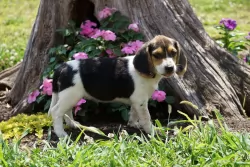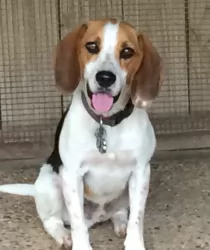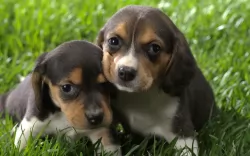 MyDogBreeds
MyDogBreeds American Pit Bull Terrier is originated from United States but Beagle is originated from United Kingdom. American Pit Bull Terrier may grow 15 cm / 6 inches higher than Beagle. American Pit Bull Terrier may weigh 19 kg / 42 pounds more than Beagle. Both American Pit Bull Terrier and Beagle has almost same life span. American Pit Bull Terrier may have less litter size than Beagle. Both American Pit Bull Terrier and Beagle requires Low maintenance.
American Pit Bull Terrier is originated from United States but Beagle is originated from United Kingdom. American Pit Bull Terrier may grow 15 cm / 6 inches higher than Beagle. American Pit Bull Terrier may weigh 19 kg / 42 pounds more than Beagle. Both American Pit Bull Terrier and Beagle has almost same life span. American Pit Bull Terrier may have less litter size than Beagle. Both American Pit Bull Terrier and Beagle requires Low maintenance.
 The history of the American Pit Bull Terrier might be a confusing one to some dog lovers and certainly to the general public that tends to lump all the “bully” breeds into a category called “pit bull”. This is because of the negative reputation this group of breeds has acquired over the past 30-50 years due to misuse and mis-breeding by the dog fighting industry. This categorization includes the American Pit Bull Terrier, The American Staffordshire Terrier, the Bull Terrier and the Staffordshire Bull Terrier.
The history of the American Pit Bull Terrier might be a confusing one to some dog lovers and certainly to the general public that tends to lump all the “bully” breeds into a category called “pit bull”. This is because of the negative reputation this group of breeds has acquired over the past 30-50 years due to misuse and mis-breeding by the dog fighting industry. This categorization includes the American Pit Bull Terrier, The American Staffordshire Terrier, the Bull Terrier and the Staffordshire Bull Terrier.
There is major confusion and disagreement on the difference between the American Pit Bull Terrier and the American Staffordshire Terrier. The AKC does not recognize the American Pit Bull Terrier as a separate breed, but its founder and the UKC, ADBA do so. In the 1930’s the American Pit Bull Terrier was a recognized breed and in response to the negativity of pit-fighting, they renamed it as the American Staffordshire Terrier.
The American Pit Bull Terrier was developed to be a little larger in size than the Staffordshire in both height and weight. This breed comes from crossing various Bull and Terrier breed to get a working dog. The Amstaff for the most part is bred to be a show dog and is not usually a “street dog” used in dog fighting rings. The direct ancestors of the APBT are the Old English Bulldogs and the Old English Terriers. These dogs are great family dogs, gentle beyond comparison unless raised to fight. They make great therapy dogs as well as police dogs. They are not by nature cruel, aggressive or attack dogs.
Both professional confirmation breeders and street fight breeds have developed new strains of the American Pit Bull Terrier. A few are worth mentioning here.
One of the oldest strains of the American Pit Bull Terrier they are red in color and that red is a very unique tone. They have a copper colored coat and nose with red nails, red lips and amber or red eyes. These dogs were originally from Ireland and when they came to America they had the red nose. Originally bred for gameness, it is the red color that is sought after now.
These are another old breed, but they have black noses and were initially bred by John P. Colby in the late 1800s. These dogs were known to be indominable fighting dogs and were bred into almost every line of American Pit Bull Terriers that exist today. The line is still maintained by the Colby family.
 There are some accounts of similar size dogs used for hunting in Greece in 5th century BCE. During 8th century the Talbot Hound breed was created. In 11th century Talbot Hound was brought to England by William the Conqueror. While using in hunting they are found to be a slow runner. To overcome the situation and increase their running speed the hunting people bred Talbot Hound with Grey hounds. The beagles described earlier were very small in size and are said as pocket beagles.
There are some accounts of similar size dogs used for hunting in Greece in 5th century BCE. During 8th century the Talbot Hound breed was created. In 11th century Talbot Hound was brought to England by William the Conqueror. While using in hunting they are found to be a slow runner. To overcome the situation and increase their running speed the hunting people bred Talbot Hound with Grey hounds. The beagles described earlier were very small in size and are said as pocket beagles.
 True to their reputation as fighters, the American Pit Bull Terrier looks like one – powerful, strong and well built. This belies their gentle disposition but too often they are judged by their looks. With a broad, brick shaped head, thick neck and deep chest, they are stocky, muscular and agile. They usually have cropped ears, but the tails are not docked. Their legs are strong and hindquarters especially muscular. These dogs are much stronger than they look. Round soulful eyes are one of the traits that people who keep these dogs as companion animals love about them. They have a scissor bite and one of the strongest jaws of all domesticated canines.
True to their reputation as fighters, the American Pit Bull Terrier looks like one – powerful, strong and well built. This belies their gentle disposition but too often they are judged by their looks. With a broad, brick shaped head, thick neck and deep chest, they are stocky, muscular and agile. They usually have cropped ears, but the tails are not docked. Their legs are strong and hindquarters especially muscular. These dogs are much stronger than they look. Round soulful eyes are one of the traits that people who keep these dogs as companion animals love about them. They have a scissor bite and one of the strongest jaws of all domesticated canines.
 They are small and compact breed, and always happy and fun loving. They should be trained by patient and creative training techniques. Beagles are very much interested in using their nose in finding interesting scents and are food focussed. They always wake their neighbours at 6 am by their half howling. They think everyone is their best friend and love to have friendship with other animals and humans. They have about 220 million scent receptors and are said as "a nose with feet" by humorist Dave Barry.
They are small and compact breed, and always happy and fun loving. They should be trained by patient and creative training techniques. Beagles are very much interested in using their nose in finding interesting scents and are food focussed. They always wake their neighbours at 6 am by their half howling. They think everyone is their best friend and love to have friendship with other animals and humans. They have about 220 million scent receptors and are said as "a nose with feet" by humorist Dave Barry.
We can see beagles at many airports in their duty. They can easily trace out the illegal things being smuggled. Since they are small in size they are suitable for apartment living. But they like to walk around several times. They should be exercised for plenty of time. Obedience training should be given to them by giving food reward. Beagles are wanderers of nature and so if possible they will try to escape. So it is necessary to make them microchipped or to wear a collar, to find them easily.
 For those who live with the American Pit Bull Terrier there is no better dog. The APBT loves people and loves children. They think they are lap dogs, and they certainly are watch dogs. They love their people but their barks at strangers at home are not because they are protecting their people but rather they are greeting the strangers into their home. Unfortunately, they will not greet another dog in the same way. However, when their people are seriously threatened they will give their lives to defend them.
For those who live with the American Pit Bull Terrier there is no better dog. The APBT loves people and loves children. They think they are lap dogs, and they certainly are watch dogs. They love their people but their barks at strangers at home are not because they are protecting their people but rather they are greeting the strangers into their home. Unfortunately, they will not greet another dog in the same way. However, when their people are seriously threatened they will give their lives to defend them.
These are strong, confident dogs who want to please their people. They love children and make great family dogs but require a strong owner and a strong pack leader. The need to be under control around other dogs and because of their strength, need a strong owner. It is their aggression towards other animals that must be controlled.
 They are very good companion for children. They love to play and spend time with children.
They are very good companion for children. They love to play and spend time with children.
They have millions of scent receptors and so they can be seen in Airports and many important places in duty. Also they are interested in hunting small rodents.
They adapt well for apartment living but they don't like being alone for a long time. If kept alone for a long time in back yard they will begin to bark and dig pit or try to escape. Beagle likes hot weather more than cold weather.
Beagles are difficult to train up. Many people say it will take about one year to house train beagles. They have an attitude of "what's in it for me". But it depends on the personality and temperament of the individual.
 Though the American Pit Bull Terrier is healthier than most large dogs, they do have an issue with hip dysplasia. Breeders have been working to breed this out of the APBT and their work in this area has helped with the other issues with the patella, heart and thyroid. The APBT can have skin allergies and Demodex Mange. This condition can be either deadly or just a localized skin issue. Immunizations and testing is essential for this breed. When not immunized, American Pit Bull Terrier puppies have a greater incidence of parvovirus than other breeds. They also might have cataracts and congenital heart disease.
Though the American Pit Bull Terrier is healthier than most large dogs, they do have an issue with hip dysplasia. Breeders have been working to breed this out of the APBT and their work in this area has helped with the other issues with the patella, heart and thyroid. The APBT can have skin allergies and Demodex Mange. This condition can be either deadly or just a localized skin issue. Immunizations and testing is essential for this breed. When not immunized, American Pit Bull Terrier puppies have a greater incidence of parvovirus than other breeds. They also might have cataracts and congenital heart disease.
 Beagle's ears should be checked occasionally for any sign of infections like discoloured wax, dirt or foul odour. Also their nails should be trimmed regularly. They should be exercised regularly in order to maintain a proper weight. The most common health problems in beagles are obesity, epilepsy and allergies.
Beagle's ears should be checked occasionally for any sign of infections like discoloured wax, dirt or foul odour. Also their nails should be trimmed regularly. They should be exercised regularly in order to maintain a proper weight. The most common health problems in beagles are obesity, epilepsy and allergies.
They are average shedders and having short hair thus it is easy to groom. They should be made to bath with a mild and non irritant shampoo.
 How you feed your American Pit Bull Terrier puppy is important to her health as an adult and long life. The adult dog should be fed one and a half to two and a half cups of high quality food twice a day. Puppies should be fed more often as they grow. DO not feed your APBT soft or canned dog food. Their food should be dry. Be careful not to feed too much as you do not want an obese American Pit Bull Terrier.
How you feed your American Pit Bull Terrier puppy is important to her health as an adult and long life. The adult dog should be fed one and a half to two and a half cups of high quality food twice a day. Puppies should be fed more often as they grow. DO not feed your APBT soft or canned dog food. Their food should be dry. Be careful not to feed too much as you do not want an obese American Pit Bull Terrier.
As previously mentioned this is a healthy breed with problems with:
These are usually inherited, and the pup may show signs early, or they could be developed later in life. They can be removed.
Hip dysplasia as in many larger, stronger breeds this can be a major problem. Breeds should test for it and APBT breeders are attempting to breed it out of the APBT.
This is a congenital issue that breeders are also breeding against and if they have it your American Bit Bull Terrier was likely born with it.
Many APBT are allergic to grasses or out outside allergens. Shots or medication can deal with these.
This is an athletic, joyful breed that loves to play, love sports and loves any activity that bonds it with its family. Some of the many sports the American Pit Bull Terrier likes to participate in include: agility, obedience competition, weight pulling, lure coursing and fly ball. He also needs backyard exercise and daily walks.
When walking your American Pit Bull Terrier, make sure she is on a leash as the breed has a tendency to be aggressive with other dogs coming into their space. The APBT loves to work. They are good therapy dogs, search and rescue dogs, even service dogs.
 After 4 weeks of birth the puppy can be given solid foods by slowly increasing the ratio for many weeks. The recommended food is fresh meat of chicken breast, lamb, turkey and lean hamburger. The vegetables can be given as raw or steamed. The vegetables that will be good for them are raw baby carrots, broccoli, cauliflower and sweet peas. The puppies should be fed 3 to 4 small meals per day as they require more nutrients for their growth.
After 4 weeks of birth the puppy can be given solid foods by slowly increasing the ratio for many weeks. The recommended food is fresh meat of chicken breast, lamb, turkey and lean hamburger. The vegetables can be given as raw or steamed. The vegetables that will be good for them are raw baby carrots, broccoli, cauliflower and sweet peas. The puppies should be fed 3 to 4 small meals per day as they require more nutrients for their growth.
The grown up dog should be fed with the same food and 1 complete meal is enough for them. The meal should be given at noon. The food should be given based on calories as they should not get overweight. In addition to food, fruits such as blueberries, raspberries, banana and mango can also be given to them periodically.
Beagles should be exercised daily in order to maintain proper weight. Beagles are average shedders and having short hair which is easy to groom. They should be made to bath periodically with a mild shampoo.
Moderate exercise such as walking and cardio exercise such as chasing a ball should be given to them for staying them to be active and for maintaining good health.